Outlet CDs
4858 products
-
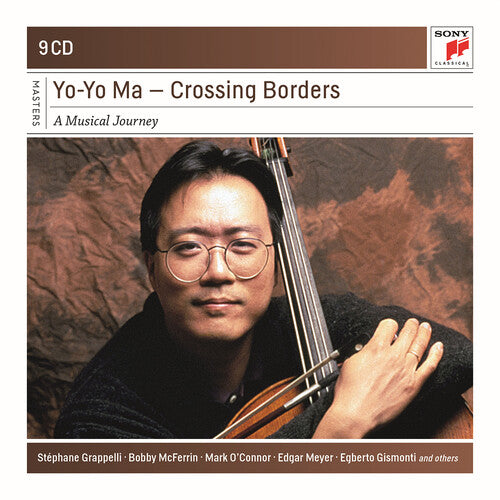
-
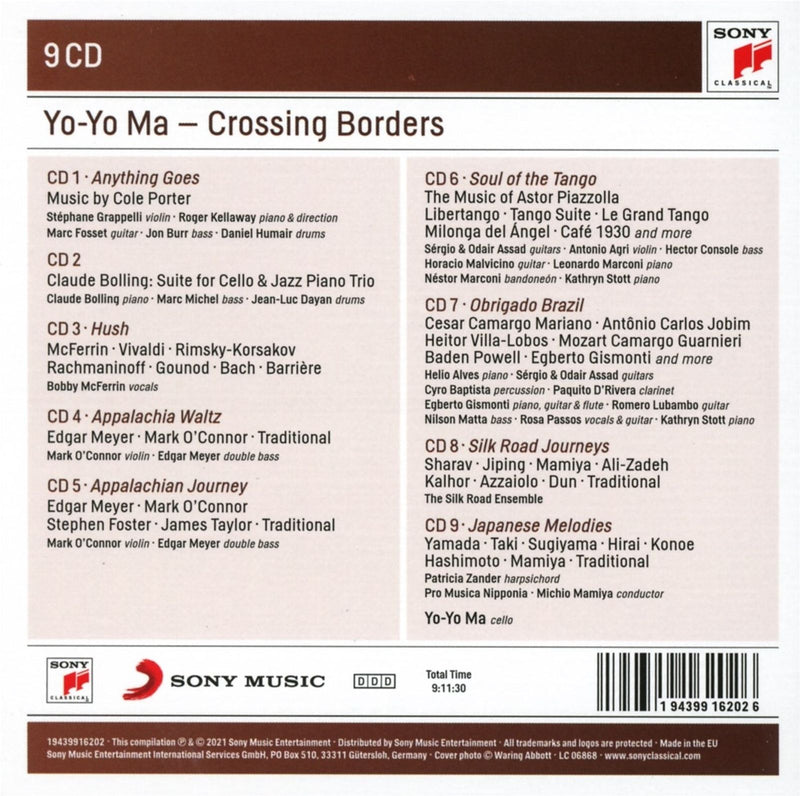
-
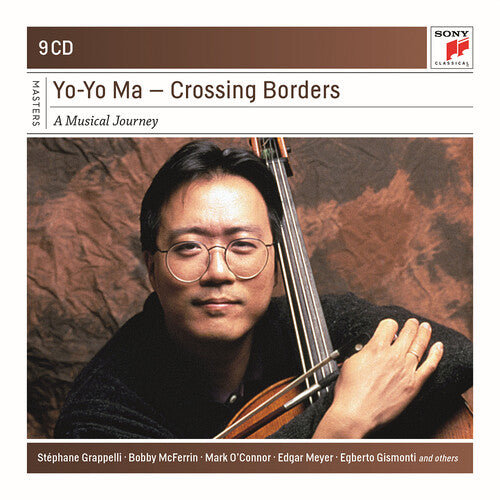 {# optional: put hover video/second image here positioned absolute; inset:0 #}
On SaleSony Masterworks
{# optional: put hover video/second image here positioned absolute; inset:0 #}
On SaleSony MasterworksCrossing Borders: A Musical Journey / Yo-Yo Ma
Sony Classical is pleased to announce a new batch of reissues from the CBS/Sony and RCA Victor/BMG back catalogues. This latest instalment...
January 21, 2022$28.98$14.48 -
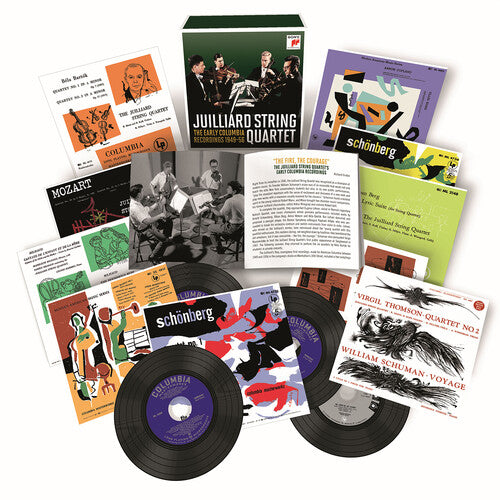 {# optional: put hover video/second image here positioned absolute; inset:0 #}
On SaleSony Masterworks
{# optional: put hover video/second image here positioned absolute; inset:0 #}
On SaleSony MasterworksJuilliard String Quartet: The Early Columbia Recordings
Following up its widely acclaimed reissues of the Juilliard Quartet’s complete Epic and RCA Victor albums – originally issued between 1956 and...
September 17, 2021$54.98$27.48 - Buxtehude: Ciacona in E minor, BuxWV160
- Chávez: Danza a Centeotl (from the Ballet 'Los cuatro soles')
- Chávez: El venado
- Chávez: Huapango de Vera Cruz
- Chávez: La bamba
- Chávez: La paloma azul
- Chávez: Los Cuatro Soles
- Chávez: Pirámide (Ballet in four acts)
- Chávez: Soli I
- Chávez: Soli II
- Chávez: Soli IV
- Chávez: Sones Mariachi for Small Mexican Orchestra
- Chávez: Symphony No. 1 ‘Sinfonía de Antígona'
- Chávez: Symphony No. 2 ‘Sinfonía India'
- Chávez: Symphony No. 3
- Chávez: Symphony No. 4: ‘Sinfonía Romántica'
- Chávez: Symphony No. 5
- Chávez: Symphony No. 6
- Chávez: Violin Concerto
- Chávez: Xochipili
- Chávez: Yaqui Music de Sonora
-
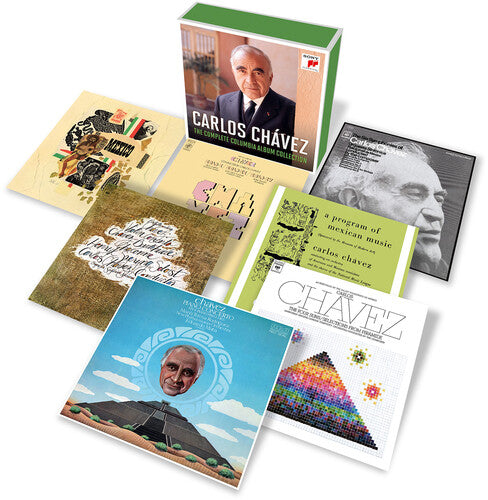 {# optional: put hover video/second image here positioned absolute; inset:0 #}
On SaleSony Masterworks
{# optional: put hover video/second image here positioned absolute; inset:0 #}
On SaleSony MasterworksChávez: The Complete Columbia Album Collection
Sony Classical is pleased to announce an important reissue of works by Carlos Chávez, one of the most influential figures in the...
July 07, 2023$46.98$23.48 -
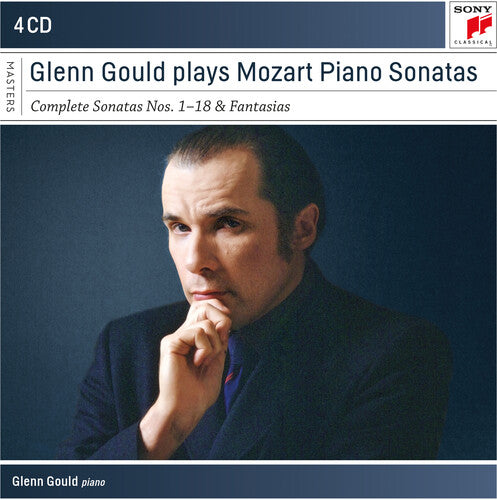
-
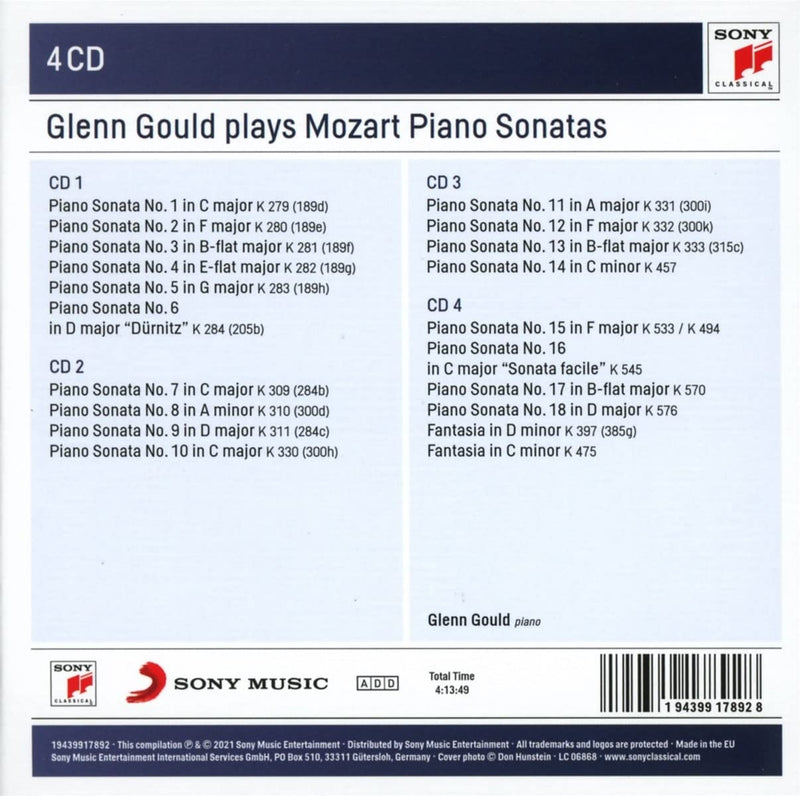
-
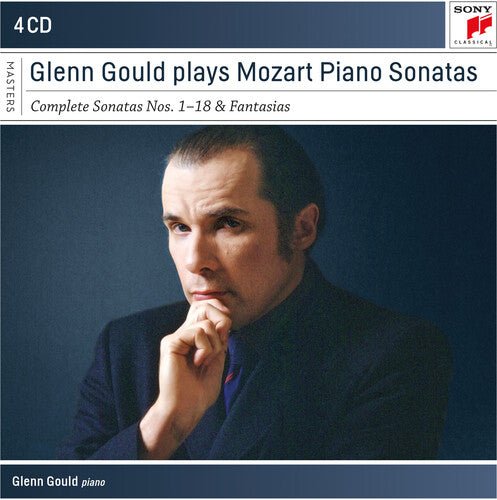 {# optional: put hover video/second image here positioned absolute; inset:0 #}
On SaleSony Masterworks
{# optional: put hover video/second image here positioned absolute; inset:0 #}
On SaleSony MasterworksGlenn Gould plays Mozart Piano Sonatas
Sony Classical is pleased to announce a new batch of reissues from the CBS/Sony and RCA Victor/BMG back catalogues. This latest instalment...
January 21, 2022$22.98$11.48 -
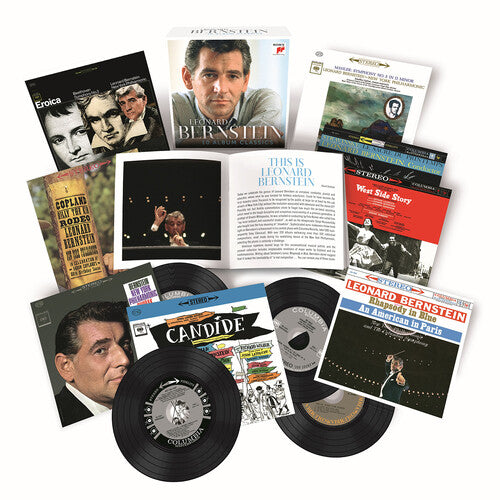 {# optional: put hover video/second image here positioned absolute; inset:0 #}
On SaleSony Masterworks
{# optional: put hover video/second image here positioned absolute; inset:0 #}
On SaleSony MasterworksLeonard Bernstein - 10 Album Classics
Sony Classical is pleased to present a special edition of Leonard Bernstein’s American Columbia recordings from the 1950s and 1960s. Some of...
June 23, 2023$49.98$24.98 -
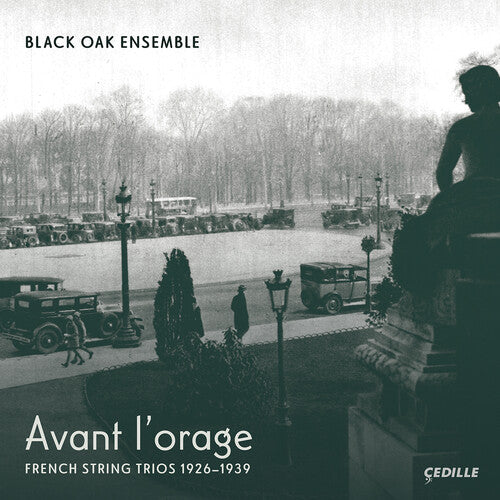
-
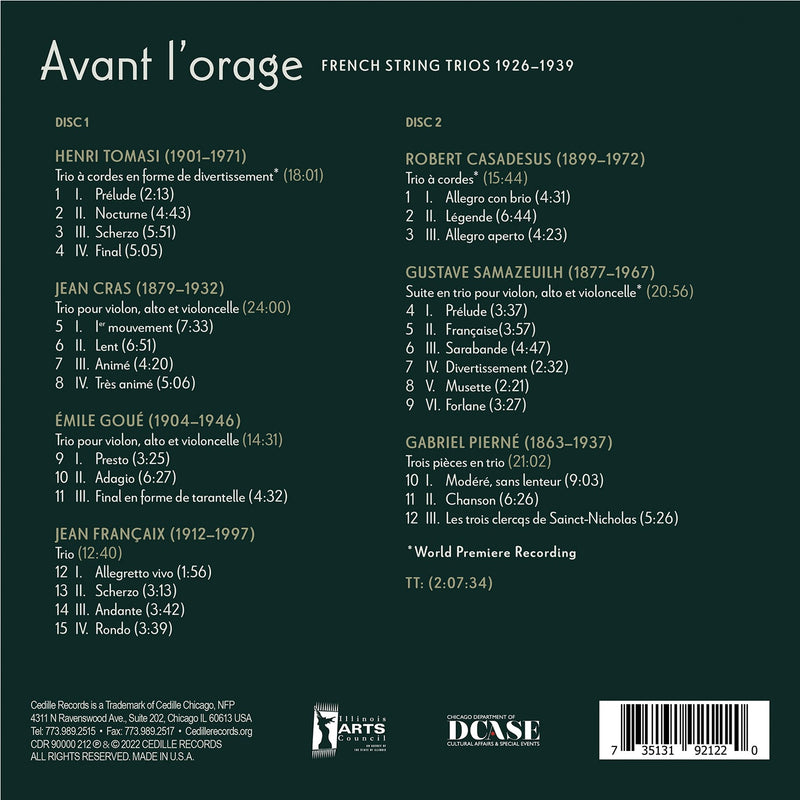
-
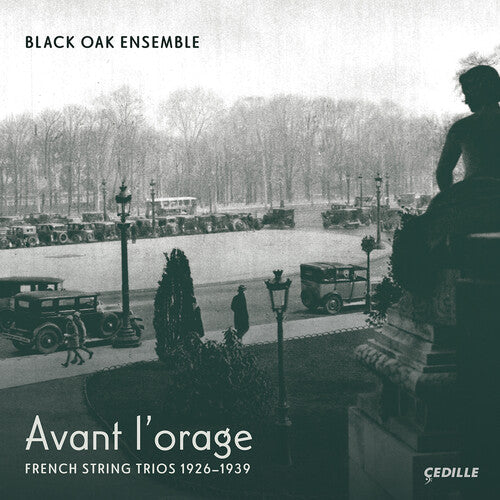 {# optional: put hover video/second image here positioned absolute; inset:0 #}
On SaleCedille
{# optional: put hover video/second image here positioned absolute; inset:0 #}
On SaleCedilleAvant l’orage - French String Trios 1926-1939 / Black Oak Ensemble
Black Oak Ensemble, the Chicago-based string trio with an international following, treats listeners to a double-album of stylish and often witty French...
July 14, 2022$19.99$9.99 -
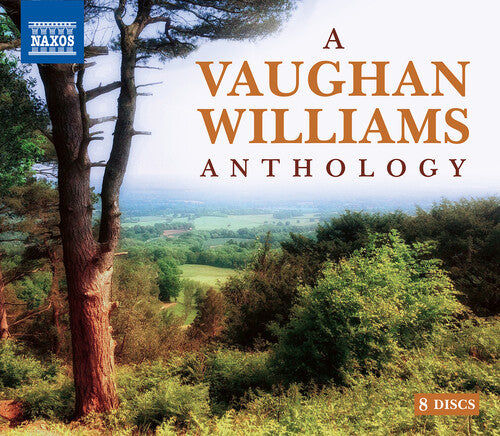
-
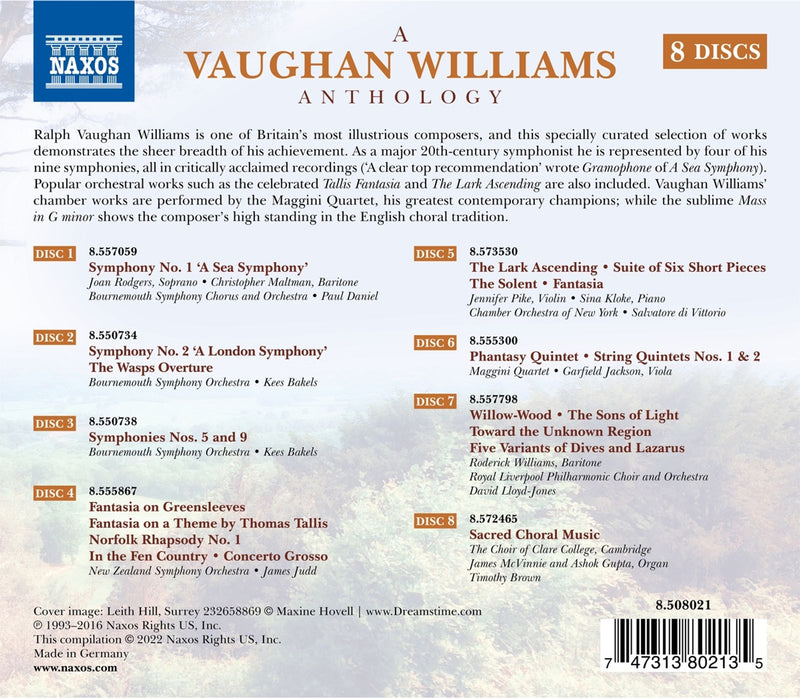
-
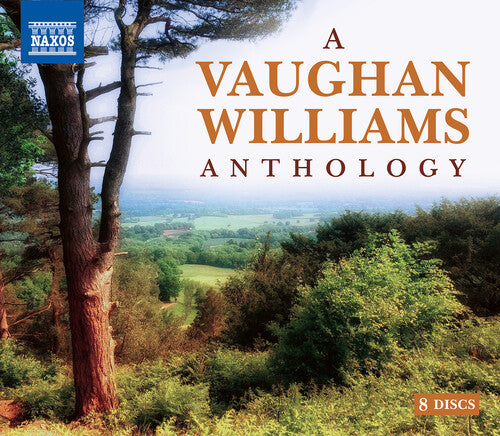 {# optional: put hover video/second image here positioned absolute; inset:0 #}
On SaleNaxos
{# optional: put hover video/second image here positioned absolute; inset:0 #}
On SaleNaxosA Vaughan Williams Anthology
Ralph Vaughan Williams is one of Britain’s most illustrious composers, and this specially curated selection of works demonstrates the sheer breadth of...
April 08, 2022$56.99$28.48 -
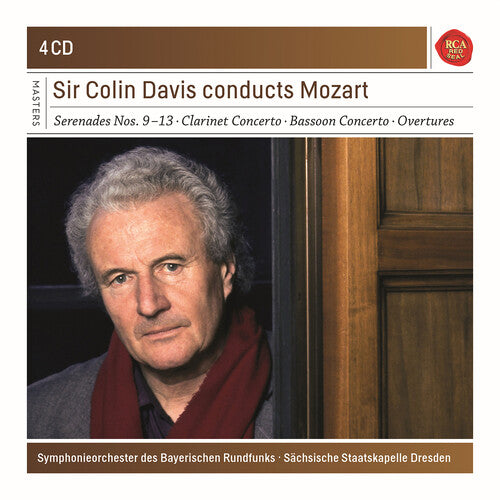
-
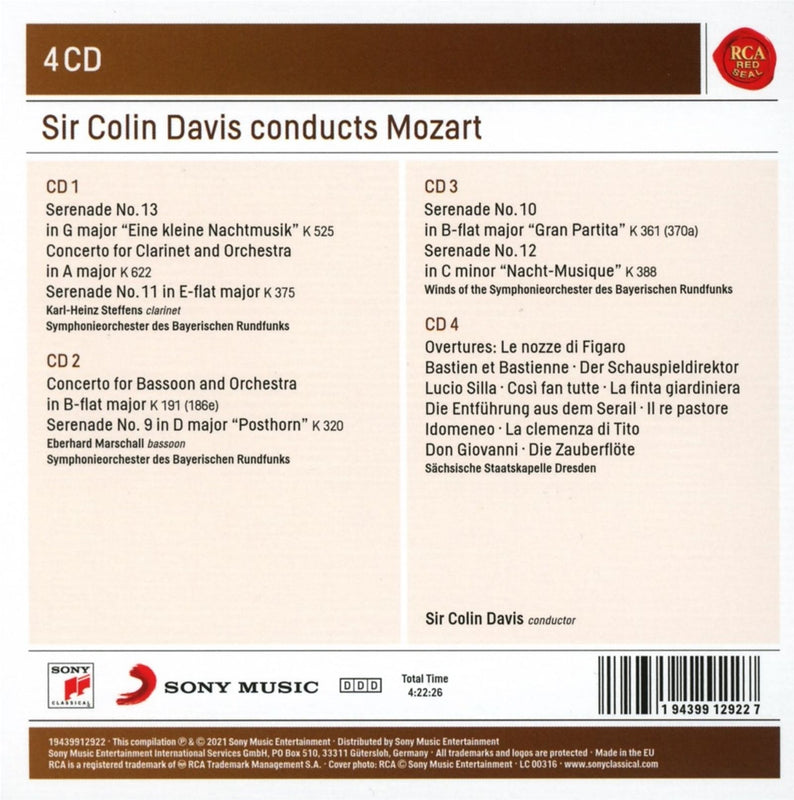
-
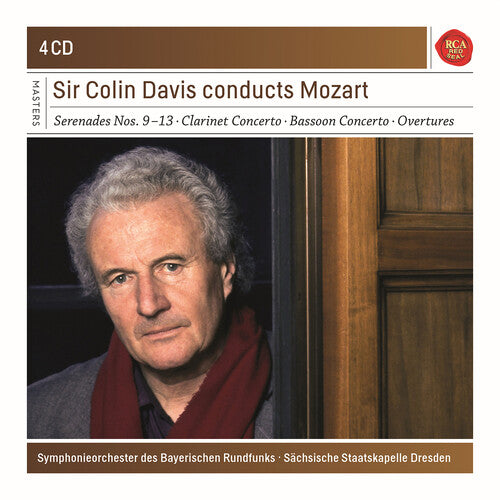 {# optional: put hover video/second image here positioned absolute; inset:0 #}
On SaleSony Masterworks
{# optional: put hover video/second image here positioned absolute; inset:0 #}
On SaleSony MasterworksSir Colin Davis Conducts Mozart
Sony Classical is pleased to announce a new batch of reissues from the CBS/Sony and RCA Victor/BMG back catalogues. This latest instalment...
January 21, 2022$22.98$11.48 -

-
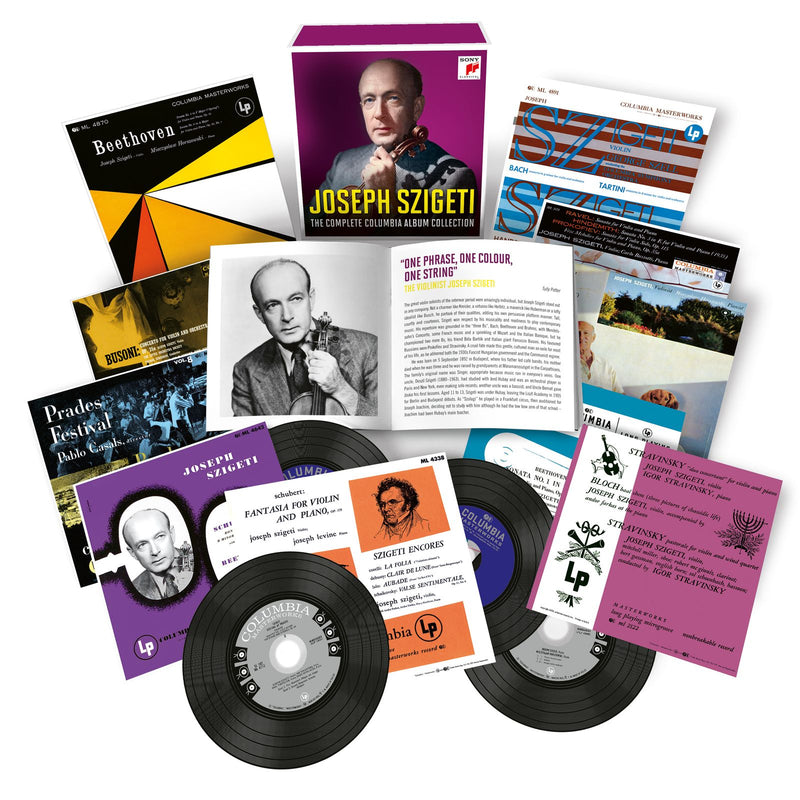
-
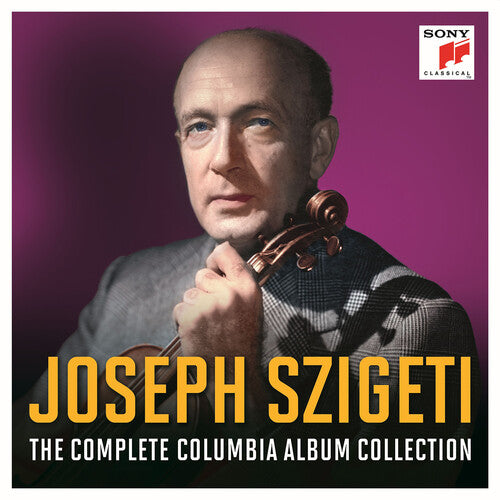 {# optional: put hover video/second image here positioned absolute; inset:0 #}
On SaleSony Masterworks
{# optional: put hover video/second image here positioned absolute; inset:0 #}
On SaleSony MasterworksJoseph Szigeti: Complete Columbia Album Collection
Sony Classical is pleased to announce the release of a 17-CD box set collecting the recordings made between 1940 and 1956 for...
April 09, 2021$59.98$29.97 -

-
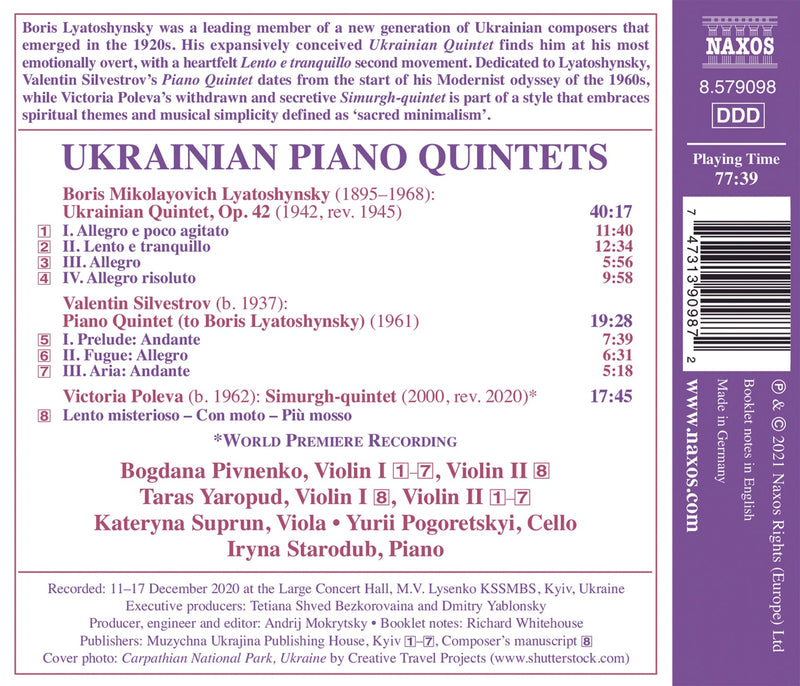
-
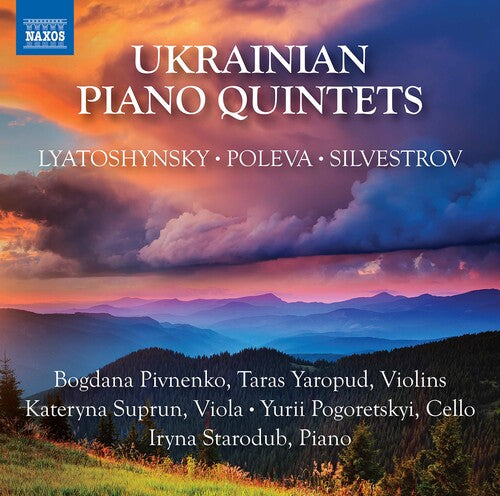 {# optional: put hover video/second image here positioned absolute; inset:0 #}
On SaleNaxos
{# optional: put hover video/second image here positioned absolute; inset:0 #}
On SaleNaxosLyatoshinsky, Poleva, Silvestrov: Ukrainian Piano Quintets
String quartet-mates Bogdana Pivnenko, Taras Yaropud, Kateryna Suprun, and Yurii Pogoretskyi join forces with pianist Iryna Starodub to bring some of Ukraine's most...
December 03, 2021$19.99$9.99 -
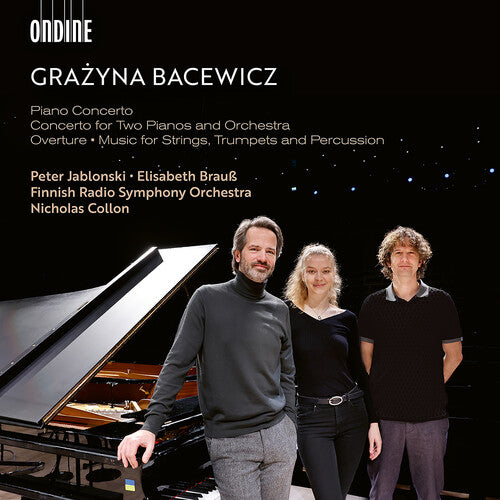
-
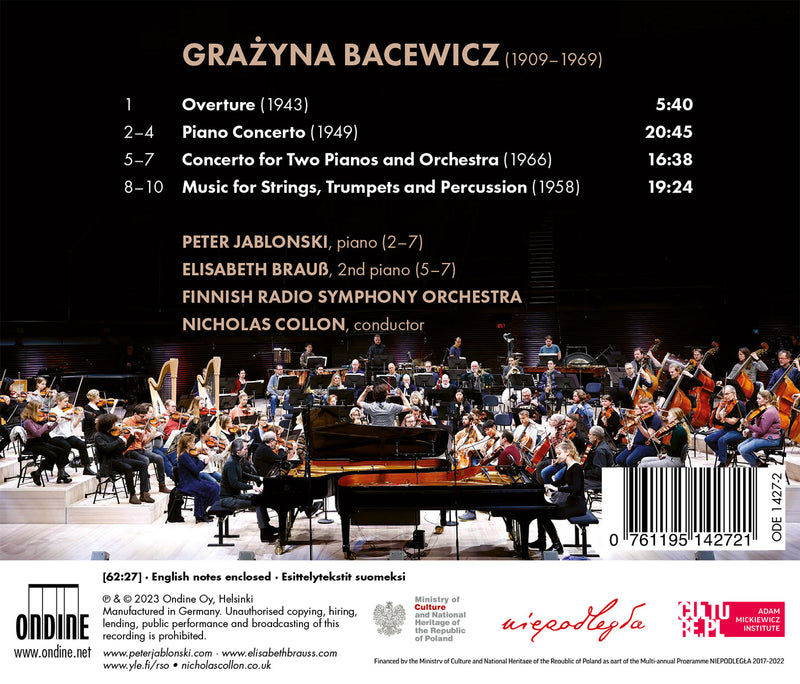
-
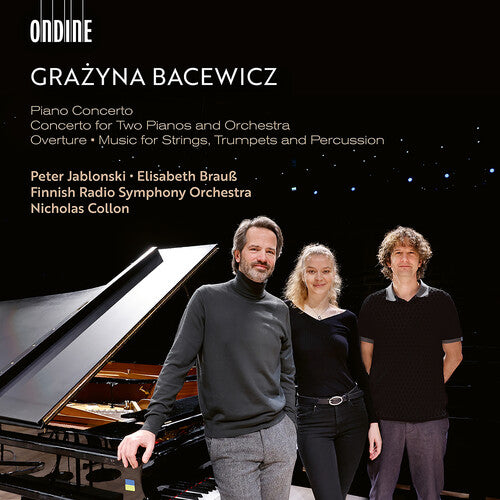 {# optional: put hover video/second image here positioned absolute; inset:0 #}
On SaleOndine
{# optional: put hover video/second image here positioned absolute; inset:0 #}
On SaleOndineBacewicz: Orchestral Works / Jablonski, Collon, Finnish Radio Symphony
The music of Grazyna Bacewicz (1909–1969) has been enjoying a revival during the past two decades. Bacewicz was an outstanding figure in...
May 05, 2023$18.99$9.49 -
 {# optional: put hover video/second image here positioned absolute; inset:0 #}
On SaleSony Masterworks
{# optional: put hover video/second image here positioned absolute; inset:0 #}
On SaleSony MasterworksThe Murray Perahia Awards Collection
The Grammys in the US, the Gramophone Awards in Britain, the Diapason d’Or in France and the ECHO Klassik awards in Germany...
May 12, 2017$47.98$23.98 -

-
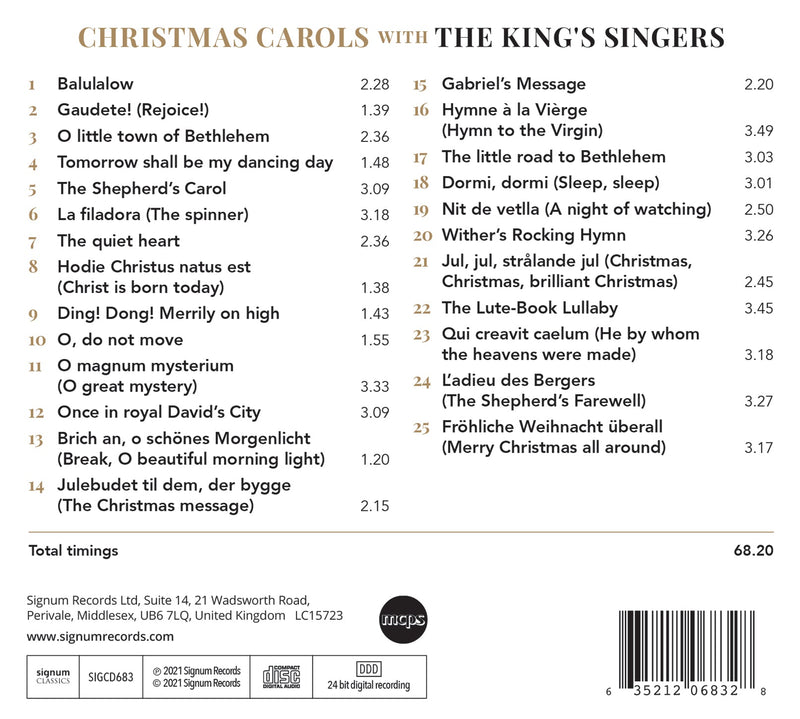
-
 {# optional: put hover video/second image here positioned absolute; inset:0 #}
On SaleSignum Classics
{# optional: put hover video/second image here positioned absolute; inset:0 #}
On SaleSignum ClassicsChristmas Carols with The King's Singers
This brand new Christmas album from The King’s Singers features 25 tracks covering everything from contemporary choral gems and folk songs through...
September 03, 2021$19.99$9.99 -
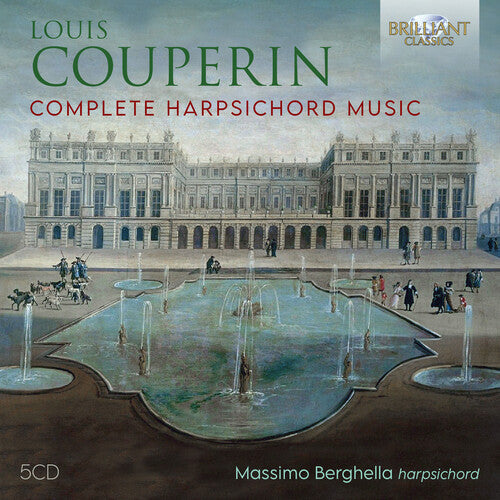
-
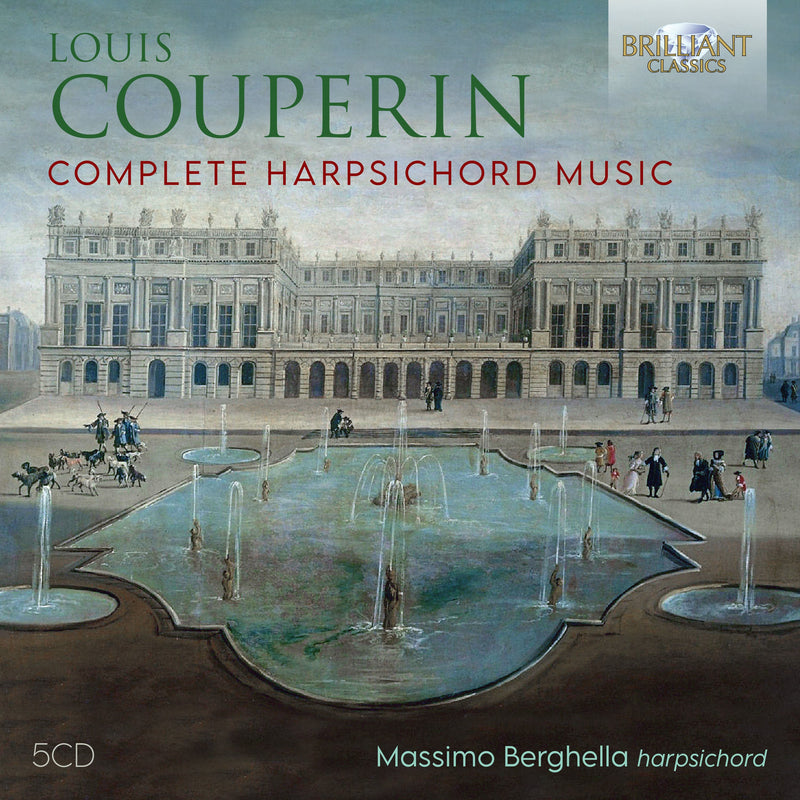
-
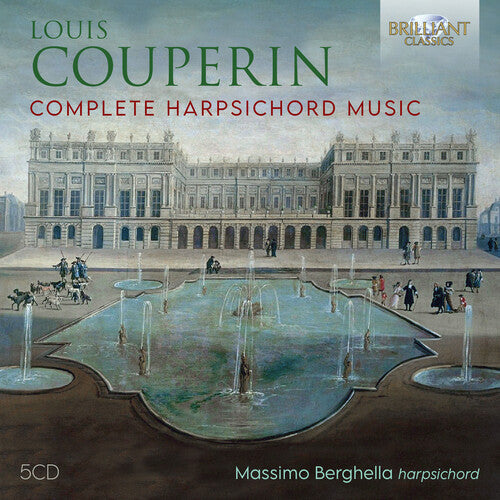 {# optional: put hover video/second image here positioned absolute; inset:0 #}
On SaleBrilliant Classics
{# optional: put hover video/second image here positioned absolute; inset:0 #}
On SaleBrilliant ClassicsL. Couperin: Complete Harpsichord Music / Berghella
Performers and listeners alike have long gravitated to Louis Couperin's music more than to that of any other member of the French...
July 28, 2023$22.99$11.49 -
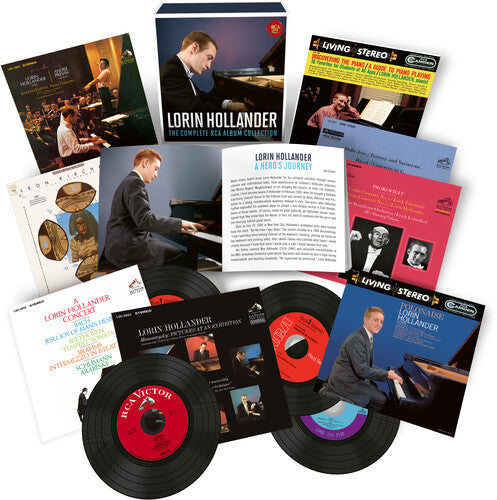 {# optional: put hover video/second image here positioned absolute; inset:0 #}
On SaleSony Masterworks
{# optional: put hover video/second image here positioned absolute; inset:0 #}
On SaleSony MasterworksLorin Hollander: Complete RCA Album Collection
The American pianist Lorin Hollander was only 14 years old in 1958 when he recorded his first album for RCA, a personal...
June 24, 2022$46.98$23.48
Crossing Borders: A Musical Journey / Yo-Yo Ma
Sony Classical is pleased to announce a new batch of reissues from the CBS/Sony and RCA Victor/BMG back catalogues. This latest instalment of the popular series showcases Mozart and Chopin along with conductor Robert Craft’s pioneering Webern recordings and the global journeys of that irrepressible musical explorer Yo-Yo Ma.
The supremely versatile Yo-Yo Ma has been aptly referred to as a musical omnivore. In addition to all the significant classical works written for his instrument, the eclectic cellist has passionately embraced the music of Latin America and Asia as well as American bluegrass and jazz. Seven of his most adventurous and acclaimed musical journeys have been collected by Sony Classical in a CD box entitled “Crossing Borders”. They include Appalachia Waltz and Appalachian Journey with Mark O’Connor and Edgar Meyer (Grammy 1998: “Best Classical Crossover Album”); Soul of the Tango – The Music of Astor Piazzolla (Grammy 1997: “Best Classical Crossover Album”); Obrigado Brazil – traditional songs and compositions by Antônio Carlos Jobim and Pixinguinha (Grammy 2000: “Best Classical Crossover Album”); Silk Road Journeys: When Strangers Meet and Japanese Melodies; Anything Goes: the cellist playing mostly Cole Porter with Stephane Grappelli; and, last but not least: Hush, his famous collaboration with Bobby McFerrin.
Review excerpts of previously released volumes included in this set:
Appalachian Journey / Yo-Yo Ma, O'Connor, Meyer
The Mark O’Connor/Yo-Yo Ma/Edgar Meyer power trio took a while to follow up their 1996 hit Appalachia Waltz, yet, no doubt about it, Appalachian Journey was worth the long wait. I love the gnarly funk of the opening cut, “1B”, with hard swinging fiddle and cello lines anchored by Meyer’s earthy, off-center pedal points. The less driving, more reflective reels, and lyrical Duet for Cello and Bass fuse bluegrass, wistful folk tunes, and stark Copland-esque landscapes into organic wholes that sound better with each rehearing. The deliciously virtuosic Caprice for Three proves that players of this caliber can channel their super-chops toward listening out loud. Guest vocal stints by James Taylor and Alison Krauss add the spice of variety to the mix, along with a potential wider audience. And why not? The arrangements are judiciously varied, perfectly paced, and exploit the violin/cello/string bass configuration in ingenuous ways. One wonders how this trio might approach certain pieces over a looser, more extended improvisational time frame. I hope we won’t have to wait another three and a half years to find out. If you’re in a blue mood, this disc will provide an antidote with long-range positive side effects. Fun, fun stuff.
-- ClassicsToday.com (10/10, Jed Distler)
Obrigado Brazil / Yo-Yo Ma:
The music on this enchanting, flavorful CD varies from classical to samba to bossa nova; the combinations range from guitar, flute, and cello to female voice (the remarkable Rosa Passos), cello, guitar, percussion, piano, and bass; to simple cello and piano; to cello and two guitars. The overriding element is rhythm; each selection has a beat which is both infectious and sensual, but the contexts are splendidly varied. It's impossible to get bored or tired listening to this creative CD; it's unique--just like Yo-Yo Ma himself--and endlessly surprising. It may not be quite what we'd call "classical" music, but it is many kinds of music, and they all will delight. The other musicians are as impressive on their instruments as Ma is with his cello, and that's saying a great deal.
-- ClassicsToday.com (Robert Levine)
Silk Road Journeys - When Strangers Meet
Silk Road Journeys is an invigorating, eye-opening ride. To be sure, some pieces fare better than others, but as with any unforgettable trip, you tend to forget the occasional bumps you hit along unknown roads. Our guides are a generally stellar selection of master artists, including the luminary pipa player Wu Man and kemencheh and setar player Kayhan Kalhor. These two musicians in particular can go head-to-head in virtuosity with Yo-Yo Ma any day. Complemented by cleanly articulated sound, Sony Classical has produced a real keeper in its Yo-Yo Ma catalog, but the cellist makes his collaborators the true focus of this album.
-- ClassicsToday.com (10/10)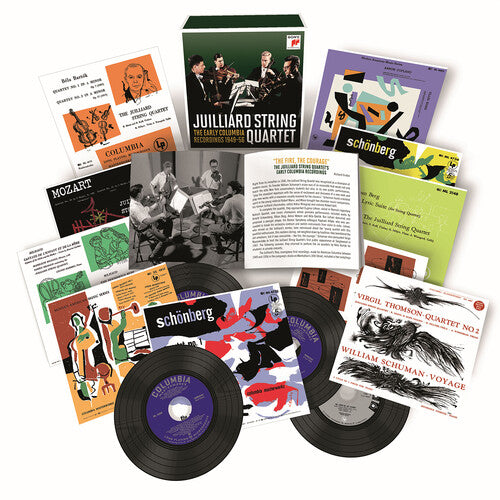
Juilliard String Quartet: The Early Columbia Recordings
Following up its widely acclaimed reissues of the Juilliard Quartet’s complete Epic and RCA Victor albums – originally issued between 1956 and 1960 – Sony Classical is excited to present a new box set collecting the earliest albums of this august American ensemble. Made between 1949 and 1956 in Columbia’s studio on Manhattan’s 30th St., these landmark recordings are mostly new to CD.
From its first appearances in New York, the Juilliard Quartet was identified as a champion of modern music. Its first recordings for American Columbia, all included here, were dedicated to the works of Alban Berg and Béla Bartók (then only recently deceased), as well as to Arnold Schoenberg (still very much alive), and to active American composers including William Schuman. But the heart of this release comprising 16 newly mastered CDs and also featuring works by Mozart, Ravel, Webern, Milhaud, Copland, Peter Mennin, Alexei Haieff and Andrew Imbrie, are three discs containing the premiere of Béla Bartók’s six quartets on records, which were set down in 1949. They appeared on LP and 78s the following year, bringing the Juilliard Quartet its first real celebrity. Recorded on 78-rpm shellacs rather than on tape, this path-breaking set thus consists of live, unedited performances. When reissued some years ago on CD – the only portion of the new Sony Classical box set ever to have appeared before on silver discs – it was rapturously praised in Fanfare magazine for “its joy of discovery, which remains completely fresh and vivid” even though numerous other traversals of the Bartók cycle had appeared in the meantime.
Another Juilliard milestone was the premiere of Arnold Schoenberg’s four quartets on records, set down in 1951–52. At last, all these historic Juilliard String Quartet recordings are available to today’s music lovers.
REVIEWS:
[An] engrossing 16-disc box set of [the Juilliard Quartet's] earliest recordings for the Columbia label, many appearing on disc for the first time.
What other quartet of that era would have made its recorded debut not with standard repertoire but with a cantata by Darius Milhaud, written just a few years before? There are works here by composers both renowned (Berg, Webern, Copland) and virtually forgotten (Peter Mennin, Alexei Haieff), all rendered in the Juilliard’s trademark sound: X-ray clear and devoid of schmaltz.
Two complete cycles anchor the set: Bartok (the first recording of his six quartets) and Schoenberg. Given how unfamiliar these works were at the time, the Juilliard’s confidence and authority is stunning. Subsequent recordings may have disclosed other aspects of this repertory, but that does not dampen the freshness and sense of discovery audible here.
-- The New York Times
If patience is a virtue, then fans of the Juilliard String Quartet’s earliest records must be saints. For only now have these much-cherished monaural recordings returned to circulation, some 70 years after their debuts, in a new 16-CD set from Sony Classical titled “Juilliard String Quartet: The Early Columbia Recordings, 1949-56.” The quartet, currently observing its 75th anniversary, is still going strong, though the present ensemble naturally comprises personnel entirely different from those selected for the group at its founding in 1946 by the composer William Schuman, then president of the famed Juilliard School in New York.
Sony has been good to the Juilliard, having previously released important sets of recordings from a bit later in the group’s life, specifically the 1950s and ’60s, when the quartet made what quickly became fabled discs for Epic and RCA Victor. The addition of this box means the quartet’s early prime is now thoroughly documented. (That said, good luck acquiring those Epic and RCA reissues, which were quicky snatched up—something worth keeping in mind while pondering this latest one.)
String quartets, with their changing personnel and specialized repertory, have rarely achieved lasting fame, at least among the larger population. They have never in modern times commanded the attention that celebrated instrumental soloists garner, and they haven’t the institutional resources that orchestras command. So releases like this one serve a special purpose. They make us aware of great musicians who might otherwise be, at best, dimly recalled. And, certainly in this case, they return to public attention extraordinary performances that should never have been out of the limelight.
-- The Wall Street Journal
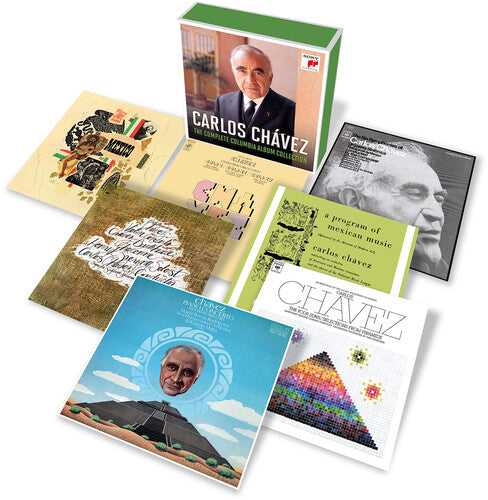
Chávez: The Complete Columbia Album Collection
Sony Classical is pleased to announce an important reissue of works by Carlos Chávez, one of the most influential figures in the history of Mexican music. Most of these recordings, which span the years 1938 to 1980, are conducted by Chávez himself and have never appeared before on CD.
CONTENTS:
Glenn Gould plays Mozart Piano Sonatas
Sony Classical is pleased to announce a new batch of reissues from the CBS/Sony and RCA Victor/BMG back catalogues. This latest instalment of the popular series showcases Mozart and Chopin along with conductor Robert Craft’s pioneering Webern recordings and the global journeys of that irrepressible musical explorer Yo-Yo Ma.
Between 1966 and 1974, Glenn Gould paid repeated visits to Columbia’s New York studio to record the piano sonatas of Mozart. Often revelatory, sometimes quirky, but always stimulating, these controversial readings tell us as much about the performer’s own endlessly fascinating musical mind and his conflicting attitudes to Mozart as they do about the composer’s genius at the keyboard. But no other classical sonatas – not even Beethoven’s – were paid the tribute of an integral recording by Glenn Gould. His delight in playing them can be heard throughout this set. Sony Classical is now reissuing the 18 sonatas and two fantasias in a remastered 4-album box.
REVIEW:
Every time I return to Glenn Gould’s set of the Mozart piano sonatas, I’m both aghast and, in some weird way, inspired. Take K310, where the central Andante cantabile rises to an awesome central climax, played staccato, but where the first movement is less Allegro maestoso than Allegro frenetico! Or there’s that strangest of beasts (in Gould’s hands), K331, the opening theme taken so slowly that it sounds as if a (very) young Glenn is tackling it for the first time, head buried in the music, humming away. Yes, things do return to a semblance of normality, though the finale is less ‘alla turca’ than a proud ‘cock o’ the walk’ Turkish trot. Then there are the two Fantasias, K397 in D minor taken at a deathly slow tempo filled with pregnant pauses, a spooky enactment with dark shadows lurking around every corner. Gould’s approach to Mozart in many respects courts extremes but I challenge you to sample any of it and not want to return, if only for a handful of spot checks. It may be outlandish but it’s also utterly fascinating.
--Gramophone (Rob Cowan)
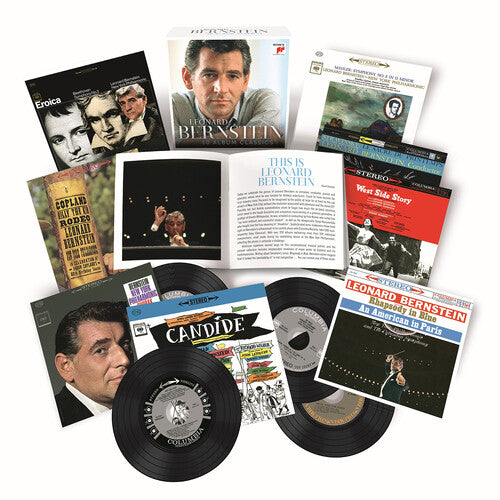
Leonard Bernstein - 10 Album Classics
Sony Classical is pleased to present a special edition of Leonard Bernstein’s American Columbia recordings from the 1950s and 1960s. Some of the conductor-composer’s most celebrated interpretations and works are collected here on these carefully chosen 10 original albums on 11 CDs.
There is, of course, the still-astonishing album that launched Leonard Bernstein’s international reputation as the most dynamic and charismatic conductor of his era, Stravinsky’s Rite of Spring recorded in January 1958 – two months after his appointment as the youngest music director in the New York Philharmonic’s history. Reviewing a 2013 reissue, ClassicsToday.com declared: “It has an excitement, spontaneity, and primal fury that no other version quite matches.”
The Bernstein recording that launched the “Mahler Renaissance” in the 1960s is also here: his Third Symphony with the New York Philharmonic, which has arguably never been surpassed. And while we’re talking about Third Symphonies, Bernstein’s “Eroica” still sounds “wonderfully vibrant” (Gramophone) a half century after its first release. There is also his reading of Dvořák’s most popular symphony – “There’s no such thing as a ‘definitive’ recording [of the “New World”], but if there were, this one would come close to that imagined ideal” (ClassicsToday) – and two from Haydn’s magnificent “Paris” set: “It’s debatable whether there have been better performances” (ClassicalNet).
Bernstein himself conducts and plays Gershwin’s Rhapsody in Blue (“The one indispensable recording of this familiar work, paired with an equally fine American in Paris” – New York Times). Bernstein the pianist also accompanies Dietrich Fischer-Dieskau, at the peak of his matchless career, in an acclaimed album of Mahler lieder. The ballets Rodeo and Billy the Kid by Bernstein’s mentor and friend Aaron Copland are included: “Even the composer couldn't make [them] dance the way Bernstein does” (New York Times).
Bernstein the composer is also generously represented. The original Broadway cast recording of Candide from 1956 is included, as is the definitive version of his most famous work: the original Broadway cast recording of West Side Story from 1957.
The re-masterings in this new collection are the best ever issued of these thrilling recordings by one of the last century’s greatest musicians, selected from the Grammy® award-winning Leonard Bernstein – The Composer and the Leonard Bernstein – Remastered editions. Sony Classical’s new 11-CD Leonard Bernstein box set is the perfect introduction to the work of this American genius.
Past praise of previously released recordings included in this set:
Mahler: Symphony No. 3 / Lipton, Bernstein, NYP
This was the finest performance of Mahler’s Third when it was first issued back in 1962, and in some ways it has never been surpassed. Bernstein catches the riotous vulgarity of the first movement march music like no other conductor–not even his own digital remake reaches the level of sheer abandon he whips up here, and he also has the best of all fifth movements (bright and cheery, with dazzlingly prominent percussion).
-- ClassicsToday.com (10/10; David Hurwitz)
Dvořák: Symphony No. 9 / Bernstein, NYP
There’s no such thing as a “definitive” recording, but if there were, this one would come close to that imagined ideal. Its special qualities haven’t dimmed a bit in decades since it was recorded, and every interpretive decision comes across with the inevitability of fate itself. First, you get the first-movement exposition repeat (very unusual for its time), then there’s the very slow (but still very flowing) Largo, gorgeously played and far from the trudge-fest that Bernstein would make of for DG. The scherzo goes like the wind, the fastest ever, and the finale offers simply the last word in excitement. If you don’t own this performance in some form, then you don’t know the “New World”.
-- ClassicsToday.com (10/10; David Hurwitz)
Avant l’orage - French String Trios 1926-1939 / Black Oak Ensemble
Black Oak Ensemble, the Chicago-based string trio with an international following, treats listeners to a double-album of stylish and often witty French treasures written between the World Wars. The ensemble offers seven rarely heard delicacies from the 1920s and 30s, including world premiere recordings of trios by Henri Tomasi, Robert Casadesus, and Gustave Samazeuilh, along with works by Jean Cras, Emile Goué, Jean Françaix, and Gabriel Pierné. Most were written for and dedicated to the virtuosic Trio Pasquier, which ranked among the era’s chamber music superstars.
Tomasi’s Mediterranean roots are heard in the Provençal folk melody referenced in his Trio à cordes en forme de divertissement, noted for its colorful, kaleidoscopic finale. Casadesus’s Trio à cordes combines fine craftsmanship and poetic sincerity. Samazeuilh, a disciple of Claude Debussy, wrote his Suite en trio in the form of a Baroque dance suite. Celtic-infused folk music of his native Brittany emerges in Cras’s Trio pour violon, alto et violoncelle, as does an homage to Beethoven’s Op. 132 string quartet. Goué wrote his Trio pour violon, alto et violoncelle, energized with folk-dance elements, on the eve of his World War II army deployment. Françaix’s Trio displays his trademark textural clarity, agility, and sense of humor. Pierné’s Trois pièces en trio has even more fun with the listener with its satirical finale conjuring intoxicated, stumbling house cats out on the town.
REVIEWS:
Occasionally you hear a commentator use the term “accessible” to describe a musical work or style. Yet, as with other terms such as “affordable” in reference to housing, without context it is virtually meaningless: we need to know who is applying the term and to what it’s being compared. So, when I assert that most listeners will find the seven works on these two smartly programmed discs “accessible”, it is as much about what they are not than what they exhibit in style and musical substance.
For anyone at all concerned about setting forth on a journey through two hours of unfamiliar 20th century chamber works–string trios, no less!–be assured that throughout this program you will encounter nothing of the atonal, anti-melodic, thematically ambiguous, or deliberately arcane efforts that characterize many works from this same period (“Avant l’orage”, “before the storm”). Regarding the term “accessible”, you will find in each of these works not only a “way in” that’s familiar and (to most listeners) comprehensible, but music that is unfailingly captivating, thought-provoking, and challenging, all in ways that both entertain and enlighten. Now how can you do better than that?
Henri Tomasi’s Trio (1938), one of three recording world premieres on the disc, makes an excellent opener, its pleasingly assertive Prélude, an uneasy, restless Nocturne, mischievous Scherzo, and relentlessly energetic, folk-like Final drawing us in with an irresistible, festive air that also shows off the Black Oak Ensemble’s range of virtuosity, color, and style.
Jean Cras’ 1926 Trio has many highlights throughout its four substantial movements (24 minutes), but the fourth may be the most notable–a dance, whose rhythmic progression and character is anything but predictable!
Jean Françaix, successful performer and prolific composer who early on caught the attention of Ravel, dedicated his 1933 Trio to the three brothers who made up the Pasquier Trio (also the dedicatees of Tomasi’s Trio). You may never have seen a tempo designation of “Allegretto vivo” (this work’s first movement), but in their delightful, dexterous, precisely controlled moto perpetuo frenzy the Black Oak musicians leave no question as to their interpretation of the term! And has there ever been a Scherzo more deserving, or illustrative, of its name? Or played with a truer sense of joy and humor? The final Rondo is a fabulously virtuosic complex of rhythm and meter changes, and again these players nail the shifts and turns with requisite technical precision and musical flair.
If you know Robert Casadesus primarily–or exclusively–as a pianist, here’s your chance to get to know some of his scarce yet very fine work as a composer. His Trio à cordes from 1938, also dedicated to the Pasquier Trio–and also a world-premiere recording–may not be the most sophisticated or inventive work on the program, but it shows an intriguing interplay among instruments and well-developed sense of momentum by force of melodic/thematic development and strong rhythmic presence.
The third premiere recording is Gustave Samazeuilh’s 1937 Suite. Although its six movements are modeled on “the form of a Baroque dance suite”, you won’t hear anything stylistically related in the music itself. Yes, it’s very tonal, but has more in common with 19th-century Romanticism. And it’s all very lovely, originally written for piano and re-scored for, you guessed it, the Trio Pasquier. Here the Black Oak players seem to revel in the inherent opportunities for highlighting the music’s richness of timbre and singing melodies.
There are many other discoveries and delights to be found in the remaining trios by Émile Goué and Gabriel Pierné–which by now you will hopefully be looking forward to hearing for yourself. And I have to say that if I were one of the composers represented here I would feel blessed to have such advocates as the three musicians of Black Oak Ensemble: Desirée Ruhstrat (violin); Aurélien Fort Pederzoli (viola); David Cunliffe (violoncello).
This is difficult, challenging music that requires not only a comprehensive, deeply felt sense of style and prodigious technical facility, but an understanding of how to differentiate the expressive demands of a collection of pieces that are in some ways similar, but in more ways quite different, and how as an ensemble to make each stand out and stand in its own deserving space. Not only does the Black Oak Ensemble achieve this, but their effort makes you more than eager to hear the whole thing again. I’m happy to say that you’ll also learn a lot from the excellent notes by Elinor Olin. Accessible, enduring, enlightening, and highly recommended.
-- ClassicsToday.com (10/10, David Vernier)
Henri Tomasi’s vital and communicative string trio is a very satisfying work written in the minor, alternating some Debussy-isms with a Stravinskian touches. The third movement includes some truly fascinating polyrhythmic figures that drive the music forward through its bitonal theme and variants, and the Finale is even more interesting, including quite a bit of non-jazz syncopation.
The trio by Jean Cras is a little more old-style but not ultra-Romantic, at least not the way it’s played here. The music uses bitonality but is not as much on the edge as the Tomasi piece, yet it is still an interesting, well-written work.
The Goué Trio is bouncy and sprightly. It contains some novel ideas as well as shifting meters and tempi in its first movement, and the last movement is an ingenious recasting of tarantella rhythms.
The Françaix trio is in his usual modern-but-entertaining style, including funny “drunk”-sounding passages in the first and last movements, although it is not one of his works most frequently recorded, and the Black Oak Ensemble again plays this, as all the other works, in a peppy manner.
Unlike most of the other composers presented here, Robert Casedesus’ compositions are relatively few. This one has some fun with overlapping and interlocking rhythmic patterns, which the notes suggest might resemble some of his train travel. The music is interesting and a little eerie-sounding—at least, until a full stop introduces a surprisingly sprightly new theme in a fast 6/8. Once again, we have here a formerly unheard gem.
Gustave Samazeuilh’s trio is the most old-fashioned-sounding, by far, in this entire collection, a real late-Romantic piece played in a post-modern manner by the ensemble. The fourth-movement “Divertissement” uses some extended chords in its harmonic base, lively use of 3/4 rhythm, as well as interesting harmonic touches in the last-movement “Forlane.”
[This] is clearly an important release for its inclusion of so much good but rarely-heard and some formerly unrecorded music. It is definitely one of the best classical releases of the year.
--The Art Music Lounge (Lynn René Bayley)
A Vaughan Williams Anthology
Ralph Vaughan Williams is one of Britain’s most illustrious composers, and this specially curated selection of works demonstrates the sheer breadth of his achievement. As a major 20th century symphonist he is represented by four of his nine symphonies, all in critically acclaimed recordings (‘A clear top recommendation’ wrote Gramophone of A Sea Symphony). Popular orchestral works such as the celebrated Tallis Fantasia and The Lark Ascending are also included. Vaughan Williams’ chamber works are performed by the Maggini Quartet, his greatest contemporary champions; while the sublime Mass in G minor shows the composer’s high standing in the English choral tradition.
REVIEW:
More Vaughan Williams—and very welcome, too. While admirers may favour other performances, every take here on the composer’s exquisite scores is more than competitive. This curated selection of works is a measure of RVW’s achievements. As a major 20th-century symphonist he is represented by four of his nine symphonies, all in much-praised recordings, while winning orchestral works such as the celebrated Tallis Fantasia and The Lark Ascending are also included. Vaughan Williams’ chamber works are performed by the Maggini Quartet, his greatest contemporary champions; while the sublime Mass in G minor is a solid addition.
-- Classical CD Source (Barry Forshaw)
Sir Colin Davis Conducts Mozart
Sony Classical is pleased to announce a new batch of reissues from the CBS/Sony and RCA Victor/BMG back catalogues. This latest instalment of the popular series showcases Mozart and Chopin along with conductor Robert Craft’s pioneering Webern recordings and the global journeys of that irrepressible musical explorer Yo-Yo Ma.
Sir Colin Davis was indisputably one of the greatest Mozart conductors of the last century, both in the opera house and in the recording studio. In Munich in the early 1990s, near the end of his tenure as chief conductor of the Bavarian Radio Symphony Orchestra, he recorded several of the popular serenades and wind concertos (“Davis is completely at home in this music and brings to it grandeur and delicacy in good measure and judicious balance” – Gramophone). And in 1998, as the Dresden Staatskapelle’s first-ever conductor laureate, he recorded twelve opera overtures (“Beautifully turned string playing, wonderful contributions from the wind section, and transparent textures: it all represents splendid ‘big band’ Mozart in the modern tradition” – Classics Today). These superb RCA recordings are now reissued in a 4-album box set.
REVIEW:
Colin Davis’s RCA Mozart CDs from the 1990s, mostly with the Bavarian RSO, tend towards more relaxed tempos than on his earlier analog recordings, a live coupling of the Posthorn Serenade and the Bassoon Concerto recorded at the Mozartfest in Würzburg in June 1992 claiming among its many virtues textural opulence (Eberhard Marschall’s bassoon is among the richest in tone that I’ve ever heard) and, as Christopher Headington noted in these pages (9/94), an unhurried finale ‘despite the Presto marking that tempts less experienced conductors’. You might additionally note Davis’s Toscanini-like vocalizing at the start of the Andantino, a romantic reading that works wonderfully well. Also included are similarly affecting accounts of Eine kleine Nachtmusik, the Wind Serenades Nos 10-12, the Clarinet Concerto (with a mellifluoussounding Karl-Heinz Steffens), and the one CD featuring the Dresden Staatskapelle, an hour’s worth of overtures. I’d never clocked on previous occasions the strong similarity between the very brief Bastien und Bastienne Overture and the opening of Beethoven’s Eroica Symphony. As Mozart orchestral compilations go, this is among the best, one that you should return to with constantly renewed pleasure. The recordings are full-bodied.
--Gramophone
Joseph Szigeti: Complete Columbia Album Collection
Sony Classical is pleased to announce the release of a 17-CD box set collecting the recordings made between 1940 and 1956 for American Columbia by the renowned Hungarian violinist Joseph Szigeti.
Szigeti had a remarkable career. Born in 1892 in Budapest, where he studied with Jenő Hubay, one of most celebrated virtuosos and teachers of that golden era of violin playing, he was praised by the iconic German violinist Joseph Joachim at his Berlin debut in 1905; lived in London for several years following his acclaimed 1907 debut and played chamber music with, among others, Myra Hess and Ferruccio Busoni; was a frequent visitor after the war to the Soviet Union, where he introduced Prokofiev’s First Violin Concerto; made his triumphant American debut at Carnegie Hall under Stokowski in 1925; toured the world during the 1930s before finally settling in the US in 1940.
It was in that year that Szigeti renewed his friendship with fellow Hungarian émigré Béla Bartók, and in April the two gave a now-legendary recital in Washington which featured Bartók’s First Violin Rhapsody of 1928 – a work dedicated to and premiered by Szigeti in Europe. In May 1940, Columbia recorded their interpretation of this “vehicle for Szigeti’s biting and wholly magnificent fiddling” (MusicWeb International) in New York. That performance appears here for the first time on CD, along with another important work by Bartók, the classic first recording of his Contrasts for clarinet, violin and piano, written for and performed with Szigeti and Benny Goodman.
The rest of the new collection displays many more treasures of Szigeti’s passionate dedication to chamber music: in Bach, Handel, Tartini, Mozart, Beethoven, Schubert, Brahms, Dvořák, Debussy, Ravel, Bloch, Busoni, Prokofiev, Stravinsky and Henry Cowell, collaborating with such artists as Andor Foldes – another Hungarian émigré – as well as with Mieczyslaw Horzowski, Myra Hess, Pablo Casals and Igor Stravinsky.
There are, of course, major orchestral works represented in the new Szigeti edition, including two towering concertos in D major – the Brahms, recorded in 1945 with Eugene Ormandy conducting the Philadelphia Orchestra, and the Beethoven, recorded in 1947 with Bruno Walter and the New York Philharmonic (“an account of impassioned grandeur” – MusicWeb International) – along with Busoni’s early Violin Concerto in D major, recorded in 1954 with Thomas Sherman conducting the Little Orchestra Society. Szigeti’s numerous Bach concerto recordings for Columbia are here as well, conducted by Casals, Fritz Stiedry and George Szell.
As Nathan Milstein, one of his great colleagues, said in a touching tribute to Szigeti, who died in 1973: “He was an incredibly cultured musician. Actually, his talent grew out of his culture. … I always admired him, and he was respected by musicians.” In his late years, Joseph Szigeti finally got the appreciation he deserved from the general public as well. Sony Classical’s new collection his Columbia recordings, many never before released on CD at Sony Classical, can only further enhance that appreciation.
REVIEWS:
Joseph Szigeti (1892-1973) was the violinistic equivalent of a “kunst diva”, just as Gidon Kremer is today. He never had a particularly beautiful tone, while his bowing and intonation grew less dependable with age. Yet Szigeti never put a wrong musical foot forward. His phrasing communicated form, character, architecture, and astute harmonic awareness, with musical considerations always taking precedence over physical expediency.
Sony/BMG’s 17-CD collection of Szigeti’s complete Columbia Masterworks recordings stands out for exemplary remasterings that stem from the best possible source material. His intense yet thoughtful collaborations with Mieczyslaw Horszowski in Beethoven’s Sonatas Nos. 1, 5, 6, and 10 have never sounded so full-bodied and detailed as they do here. The same goes for the 1947 Beethoven Concerto, where the New York Philharmonic turns in firm and insightfully aligned playing under Bruno Walter’s direction. It contrasts to the conductor’s relatively casual and deferential backing in Szigeti’s 1932 recording, which, however, finds Szigeti on far better form.
Rehearing Szigeti’s 1949 Bach Sonata No. 3 in C major for violin solo reminded me just how much more fluent and controlled this performance is in comparison to the violinist’s relatively tenuous Vanguard remake. Likewise, his masterful 1940 account of the D minor concerto based on Bach’s keyboard concerto BWV 1052 is technically, musically, and sonically superior to the bloated 1950 reading under Pablo Casals’ direction. Szigeti’s Casals Festival contributions are admittedly uneven.
His collaborations with Béla Bartók, Igor Stravinsky, and Henry Cowell are both historically important and musically illuminating. Somehow the older Szigeti’s wiry tone imparts welcome character and tension to sonatas by Hindemith, Ravel, and Busoni, as well as the rarely heard Prokofiev solo sonata and Busoni concerto. It must be said, though, that the latter’s final scherzando-like passages are heavy going for the veteran violinist, as are the Busoni sonata’s overextended fugal sequences.
Listeners expecting suaveness and elegance in Brahms’ G major Op. 78 and D minor Op. 108 sonatas with Horszowski may wince at Szigeti’s tremulous and effortful execution. Still, he makes every note count, and the aching fragility that emerges from Op. 78’s outer movements and Op. 108’s deliberately unfolding third movement compels my undivided attention. Yet this Brahms D minor pales next to the power and authority of Szigeti’s great 78 rpm edition with pianist Egon Petri. As for the short encore-type pieces favored in the shellac era, Szigeti plays them dutifully rather than lovingly; he wasn’t a charmer like Kreisler, Elman, Milstein, or Ricci. Or Heifetz, for that matter.
The booklet includes full discographical data, an informative essay by Tully Potter, and Szigeti’s own notes for a 1970 Japanese reissue of his Schubert recordings. Even if just half of this collection represents Szigeti at his best, Sony/BMG’s comprehensive and meticulous production values deserve the highest accolades. In the meantime, a complete edition of Szigeti’s pre-war European 78s is long overdue.
-- ClassicsToday.com (Jed Distler)
The 31 works, from sonatas to chamber works to concertos, span Bach and Beethoven to Debussy, Ravel, Busoni and Henry Cowell. Bartók is pianist in his own Rhapsody No 1 for Violin and Piano. All the Brahms, including the Trio No 2 in C major with Hess and Casals, is to treasure. Szigeti plays Dvořák with grace and melancholy, and gives bite and attack to Stravinsky. The style may be redolent of another era, yet still this playing speaks to us.
– Guardian (UK)
This is a quite wonderful set, one of the highlights being an all-Busoni disc, the Second Sonata with Mieczysπaw Horszowski and the Violin Concerto with the Little Orchestra Society under Thomas Sherman. No one listening could fail to grasp the profound level of Szigeti's musical understanding.
– Gramophone
SET CONTENTS
DISC 1:
Bartók: Violin Rhapsody No. 1, Sz.87 (Remastered)
Bartók: Contrasts for Clarinet, Violin and Piano, Sz.111
Bloch: Three Pictures of Chassidic Life for Violin and Piano (Remastered)
Milhaud (arr. Lévy): Saudades do Brasil, Op. 67: No. 9, Sumare (Remastered)
Falla (arr. Levy): El Sombrero de Tres Picos, Parte I, Danza de la molinera (Remastered)
Mozart: Divertimento No. 15 in B-Flat Major, K. 287, "2. Lodronsche Nachtmusik" (Remastered)
DISC 2:
Mussorgsky-Rachmaninoff: Sorochintsy Fair, Act III: No. 5, Gopak (Remastered)
Dvorák (arr. Kreisler): Slavonic Dance in E Minor, Op. 46, No. 2 (Arr. in G Minor) (Remastered)
Dvorák (arr. Kreisler): Slavonic Dance No. 3 in A-Flat Major, Op. 46, No. 3 (Arr. in E Minor) (Remastered)
Hubay: Scènes de la Csárda No.4, Op. 32, "Hejre Kati", I. Lento ma non troppo. Allegro moderato (Remastered)
Hubay: Scènes de la Csárda No.4, Op. 32, "Hejre Kati", II. Allegro molto (Remastered)
Kodály (arr. Szigeti): Háry János Suite, IZK 26: V. Intermezzo (Remastered)
Brahms: 21 Hungarian Dances for Orchestra, WoO 1: No. 5 in G Minor (Remastered)
Debussy: Violin Sonata No.3 in G Minor, L. 140 (Remastered)
Hubay: The Zephyr, Op. 30, No. 5 (Remastered)
Schubert, Francois: Bagatelle Op. 13, No. 9, "Die Biene" (Remastered)
Stravinsky: Duo Concertant for Violin and Piano
Stravinsky: Pastorale, Song without Words for Violin & Woodwind Quartet
Stravinsky: Russian Maiden's Song
DISC 3:
Beethoven (Cadenza: Joseph Joachim): Violin Concerto in D Major, Op. 61
DISC 4:
Brahms: Violin Concerto in D Major, Op. 77
Brahms: Violin Sonata No.3 in D Minor, Op.108: II. Adagio
DISC 5:
Beethoven: Violin Sonata No.1 in D Major, Op. 12, No. 1 (Remastered)
Schubert: Violin Sonata in D Major, D.384
Schubert (arr. Friedberg): Piano Sonata No.17 in D Major, D.850: IV. Rondo. Allegretto moderato (Remastered)
Beethoven: Violin Sonata No.7 in C Minor, Op. 30, No. 2 (Remastered)
DISC 6:
Prokofiev: Violin Sonata No.1 in F Minor, Op. 80 (Remastered)
Prokofiev: Violin Sonata No. 2 in D Major, Op. 94bis (Remastered)
DISC 7:
Bach, J.S.: Violin Sonata No. 3 in C Major, BWV 1005
Bach, J.S. (arr. Reitz): Keyboard Concerto No. 1 in D Minor, BWV 1052
DISC 8:
Schubert: Fantaisie for Piano & Violin in C Major, Op.Posth. 159, D. 934
Corelli (arr. H. Leonard): Violin Sonata in D Minor, Op.5 No.12 "La Folia" (Variations Serieuses)
Debussy (arr. Roelens): Suite bergamasque, L. 75: No. 3. Clair de lune
Lalo (arr. Szigeti): Aubade from "Le Roi d'Ys" (Act III)
Tchaikovsky: 6 Pieces, Op. 51: No. 6, Valse sentimentale
Bach, J.S. (arr. Szigeti): Violin Partita No.3 in E Major, BWV 1006: VI. Bourrée (Remastered)
DISC 9:
Bach, J.S.: Concerto for Flute, Violin and Keyboard in A Minor, BWV 1044 (Remastered)
Bach, J.S.: Violin Concerto No. 1 in D Minor, (arr. BWV 1052/1056) (Remastered)
Bach, J.S.: Brandenburg Concerto No. 5 in D Major, BWV 1050
DISC 10:
Schubert: Rondo in B Minor for Piano and Violin, D.895 (Op.70) "Rondeau brillant"
Beethoven: Violin Sonata No.10 in G Major, Op. 96 (Remastered)
Schubert: Violin Sonata in A Major, Op. 162. D. 574 "Grand Duo" (Remastered)
DISC 11:
Brahms: Piano Quartet No. 3 in C Minor, Op. 60
Brahms: Piano Trio No. 2 in C Major Op. 87
DISC 12:
Cowell: Sonata No. 1 for Violin and Piano (1945) (Remastered)
Shapero: Sonata for Piano Four Hands (1941) (Remastered) (Harold Shapero, piano; Leo Smit, piano)
Cowell: Celestial Vision: How Old Is Song? (Remastered)
DISC 13:
Beethoven: Violin Sonata No.5 in F Major, Op. 24 "Spring"
Beethoven: Violin Sonata No. 6 in A Major, Op. 30, No. 1
DISC 14:
Bach, J.S. (arr. Szigeti): Violin Concerto in G Minor, BWV 1056 (Remastered)
Handel: Violin Sonata in D Major, HWV 371 (Remastered)
Tartini (Cadenzas: Szigeti): Violin Concerto in D Minor, D. 45 (Remastered)
Tartini: Violin Sonata in G Major, B. G19 (Remastered)
DISC 15:
Ravel: Violin Sonata No.2 in G Major, M. 77
Hindemith: Violin Sonata in E Major (1939)
Prokofiev: Sonata for Solo Violin in D Major, Op. 115 (Remastered)
Prokofiev: Five Melodies for Violin and Piano, Op. 35bis (Remastered)
DISC 16:
Busoni: Violin Concerto, Op.35a, BV 243
Busoni: Violin Sonata No.2, Op.36a, BV 244
DISC 17:
Brahms: Violin Sonata No.1 in G Major, Op. 78 "Regen" (Remastered)
Brahms: Violin Sonata No.3 in D Minor, Op.108 (Remastered)
Lyatoshinsky, Poleva, Silvestrov: Ukrainian Piano Quintets
String quartet-mates Bogdana Pivnenko, Taras Yaropud, Kateryna Suprun, and Yurii Pogoretskyi join forces with pianist Iryna Starodub to bring some of Ukraine's most brilliant twentieth-century music to the world.
Boris Lyatoshynsky was a leading member of a new generation of Ukrainian composers that emerged in the 1920s. His expansively conceived Ukrainian Quintet finds him at his most emotionally overt, with a heartfelt Lento e tranquillo second movement. Dedicated to Lyatoshynsky, Valentin Silvestrov’s Piano Quintet dates from the start of his Modernist odyssey of the 1960s, while Victoria Poleva’s withdrawn and secretive Simurgh-quintet is part of a style that embraces spiritual themes and musical simplicity, referred to as sacred (or 'holy') minimalism in the West.
REVIEW:
Violinist Bogdana Pivnenko and her team make a strong case for the Poleva's Simurgh-quintet, showing great sensitivity, yet also enough dynamic range to create a sense of momentum towards the ending. The pioneering nature of this disc will hopefully encourage more exploration of this repertoire.
-- Gramophone
Bacewicz: Orchestral Works / Jablonski, Collon, Finnish Radio Symphony
The music of Grazyna Bacewicz (1909–1969) has been enjoying a revival during the past two decades. Bacewicz was an outstanding figure in 20th-century music, a major Polish composer and a versatile musician. This album by the award-winning pianist Peter Jablonski, pianist Elisabeth Brauß, the Finnish Radio Symphony Orchestra and conductor Nicholas Collon includes some rarely recorded gems: the composer’s Piano Concerto together with the late Concerto for Two Pianos and Orchestra in its first digital recording. Also included is the composer’s homage to Bartók, Music for Strings, Trumpets and Percussion, as well as the composer’s early exuberant Overture, written during the German occupation of Poland.

The Murray Perahia Awards Collection
The Grammys in the US, the Gramophone Awards in Britain, the Diapason d’Or in France and the ECHO Klassik awards in Germany are among the organizations that have picked out many of Perahia’s recordings as some of the finest of their day. This set is devoted to Perahia’s award-winning discs for Sony Classical / CBS Masterworks. These also trace the story of his journey through the musical world, capturing magnificent collaborations, unforgettable partnerships and peerless solo accounts alike.
Christmas Carols with The King's Singers
This brand new Christmas album from The King’s Singers features 25 tracks covering everything from contemporary choral gems and folk songs through to well-loved carols. Dotted throughout the album are several of the most famous English church carols, which take The King’s Singers right back to their earliest singing days, and which also reflect the group’s heritage at King’s College, Cambridge. In Christmas Carols with The King’s Singers, the group bottle that frosty, moonlit, fireside Christmas wonder and pour it into their sound.
The King’s Singers have represented the gold standard in a cappella singing on the world’s greatest stages for over fifty years. They are renowned for their unrivalled technique, versatility and skill in performance, and for their consummate musicianship, drawing both on the group’s rich heritage and its pioneering spirit to create an extraordinary wealth of original works and unique collaborations.
REVIEWS:
If you love a capella men’s ensembles in Christmas music the King’s Singers are for you. This new album has some of the most beautiful ensemble singing I’ve heard in a long time. The arrangements are all tasteful and the singing, both in solos and ensemble, exquisite. These are not the same singers that recorded some truly ugly arrangements in some truly ugly albums several decades ago. Back them there seemed to be an attempt by their producers to make the King Singers more “withit” by recording them in arrangements that someone deemed funny or original. Since then someone brought the group back to what they do best. There are a number of familiar carols here (`Ding! Dong! Merrily on High!’, `Tomorrow Shall be my Dancing Day’, etc.), but also some newer carols that are really lovely (`The quiet heart’, `The little road to Bethlehem’, `O, do not move’). What a suitable disc for a wintry evening by the fire! Notes, texts, and translations.
-- American Record Guide
L. Couperin: Complete Harpsichord Music / Berghella
Performers and listeners alike have long gravitated to Louis Couperin's music more than to that of any other member of the French keyboard school of the time, probably because of its fascinating and surprising harmonic language. There are 129 pieces catalogued as authentic.
In making this new recording of all 129 pieces, Massimo Berghella has chosen to take the Preludes as starting points for ‘suites’ – 17 in all – which gather up the remaining dance movements into coherent sequences cast in the same key as the relevant Prelude.
Among the most distinguished active Italian harpsichordists, Massimo Bergella studied with Kenneth Gilbert at the Mozarteum in Salzburg and at the Accademia Chigiana in Siena. He has a 30-year-long career as a teacher himself, as well as a performance diary and discography that has taken him across Europe for recitals, broadcasts and recordings. Of a previous album of d’Anglebert, La Nazione remarked that Berghella ‘grasps the reconstructive necessity of the scores, performing them in all their poetic complexity.’
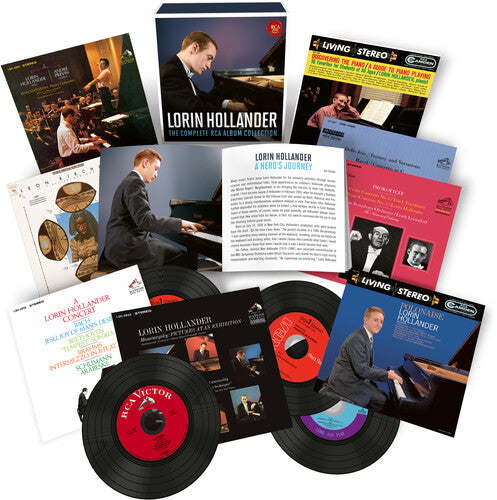
Lorin Hollander: Complete RCA Album Collection
The American pianist Lorin Hollander was only 14 years old in 1958 when he recorded his first album for RCA, a personal selection of “22 Favorites” entitled Discovering the Piano. Its success led to a sequel the following year. Over the next eight years he produced an acclaimed series of releases for the Red Label, establishing an international career which would eventually encompass more than 2,500 appearances as a pianist, conductor and passionate advocate for arts education. Hollander has performed with many of the world’s leading orchestras and collaborated with conductors such as Bernstein, Szell, Ormandy, Leinsdorf, Previn, Haitink, Ozawa and Mehta. Sony Classical is now pleased to present a new 8-disc box set offering Lorin Hollander’s complete RCA discography for the first time on CD.
A child prodigy, he was born in New York City into a musical family – his father was associate concertmaster of the NBC Symphony Orchestra under Toscanini. Lorin began playing the piano at the age of three and within two years had memorized the complete first book of the Well-Tempered Clavier. At eleven, he made his Carnegie Hall début playing Mozart’s C major Concerto K 467. His list of distinguished teachers and mentors includes Eduard Steuermann, Olga Stroumillo, Leon Fleisher, Max Rudolf and Rudolf Serkin.
Sony’s Lorin Hollander box begins with those two early albums of “favorites” by Bach, Mozart, Beethoven, Schubert, Schumann, Chopin, Mendelssohn, Liszt, Brahms, Grieg, Rimsky-Korsakov, Falla, Granados, Rachmaninoff and Paderewski. In 1963, with Erich Leinsdorf and the Boston Symphony, he premièred and recorded the Fantasy and Variations for Piano and Orchestra by Norman Dello Joio. RCA Victor’s release, a coupling with the Ravel G major Concerto, became Hollander’s international record début and found critical acclaim on both sides of the Atlantic. High Fidelity in the US wrote that “the eighteen-year-old pianist’s amazing digital skill and bravura are just what are demanded for the Fantasy and Variations”, while Gramophone in the UK, was grateful for “our first taste on records of the music of Norman Dello Joio, the 50-year-old New York composer who was at one time a pupil of Hindemith. The piano part is immensely athletic: Hollander scuttles up and down the keyboard with great efficiency, and the orchestra is equally on its toes.”
Hollander recorded further virtuoso concertos in 1964 and 1965. The Prokofiev Fifth, also with Leinsdorf and the BSO, was hailed as “a super-brilliant performance” by High Fidelity. Of the Khachaturian Piano Concerto coupled with Bloch’s Scherzo fantasque – made in London with the Royal Philharmonic Orchestra under André Previn – High Fidelity wrote enthusiastically: “The Scherzo fantasque has many of the jagged dissonances and virile qualities of Bloch’s writing in the early Twenties. It is fiercely virtuosic and thus ideally suited to the percussive, tigerish Mr. Hollander. In the Khachaturian … Hollander’s work is also first-rate technically … I find the performance excellent.”
Two solo albums from 1965 and 1966 rounded out Hollander’s RCA discography, Mussorsky’s Pictures at an Exhibition, coupled with works by Prokofiev and Rachmaninoff, and a coupling of Beethoven’s “Tempest” Sonata, the Schumann Arabeske, a Brahms Intermezzo and Myra Hess’s beloved Bach transcription “Jesu, Joy of Man’s Desiring”. The set concludes with a curiosity, recorded for Columbia’s “Modern American Music Series” in 1973: the concert work for soprano and chamber ensemble fashioned by American composer Leon Kirchner from his opera Lily. Kirchner plays the piano part and conducts an ensemble featuring Lorin Hollander on celesta, clarinettist Richard Stoltzman, violinist James Buswell and violist Nobuko Imai. The soprano soloist is Diana Hoagland.
SET CONTENTS
DISC 1:
• Rimsky-Korsakoff (arr. Rachmaninoff): Flight of the Bumblebee
• Granados: Spanish Dance in E Minor, Op. 5, No. 5 "Playera - Andaluzia"
• Schubert: Momento Musical In F Minor, Op. 94, No. 3
• Mendelssohn: Venetian Boat Song, No. 6
• Chopin: Etude in C Minor, Op. 10, No. 12 "Revolutionary"
• Paderewski: Menuet célèbre in G Major
• Falla: Ritual Fire Dance
• Liszt: Liebestraum No. 3
• Chopin: Für Elise (Albumblatt)
• Chopin: Prelude in C Minor, Op. 28/20
• Brahms: Waltz in A-Flat Major, Op. 39/15
• Debussy: Claire de lune
• Chopin: Waltz in C Sharp Minor, Op. 64/2
• Beethoven: Minuet No. 2 in G Major
• Mozart: Piano Sonata No. 16 in C Major, K. 545: I. Allegro "Sonata Facile"
• Mozart (arr. Hollander): Minuet (From "Don Giovanni")
• Bach: Two-Part Invention No. 13 in A Minor, BWV 784
• Schumann: Album für die Jugend, Op. 68: X. Fröhlicher Landmann, von der Arbeit zurückkehrend.
• Schumann: Album für die Jugend, Op. 68: II. Soldatenmarsch. Munter und straff
• Schumann: Träumerei
• Grieg: Anitra's Dance
• Chopin: Etude in G-Flat, Op. 25, No. 9 "Butterfly"
DISC 2:
• Chopin: Polonaise in A-Flat Major, Op. 53
• Chopin: Scherzo No. 2 in B-Flat Minor, Op. 31
• Liszt: Hungarian Rhapsody No.6 in D-Flat Major, S.244/6
• Liszt: Mephisto Waltz No. 3, S.216
• Brahms: 3 Intermezzi, Op. 117/2
• Brahms: Rhapsody in G Minor, Op. 79/2
• Rachmaninoff: Prelude in C-Sharp Minor, Op. 3/2
DISC 3:
• Dello Joio: Fantasy and Variations for Piano and Orchestra
• Ravel: Piano Concerto in G Major
Lorin Hollander, piano / Boston Symphony Orchestra / Erich Leinsdorf, conductor
DISC 4:
• Prokofiev: Violin Concerto No. 1 in D Major, Op. 19 [Erick Friedman, violin]
• Prokofiev: Piano Concerto No. 5 in G Major, Op. 55
Lorin Hollander, piano / Boston Symphony Orchestra / Erich Leinsdorf, conductor
DISC 5:
• Khachaturian: Piano Concerto in D-Flat Major, Op. 38
• Bloch: Scherzo fantasque, B. 78
Lorin Hollander, piano / Royal Philharmonic Orchestra / Andre Previn, conductor
DISC 6:
• Mussorgsky: Pictures at an Exhibition
• Rachmaninoff: Prelude In C-Sharp Minor, Op. 3/2
• Prokofiev: Toccata, Op. 11
DISC 7:
• Beethoven: Sonata No. 17 in D Minor, Op. 31/2 "The Tempest
• Bach, J. S. (arr. Hess): Choral: "Jesu, Joy of Man's Desiring"
• Brahms: Intermezzo in B-Flat Minor, Op. 117/2
• Schumann: Arabeske, Op. 18
DISC 8:
• Kirchner: Lily (1973)
Diana Hoagland, soprano / Columbia Chamber Soloists / Leon Kirchner, pianist/conductor
• Kirchner: String Quartet No. 2 (1958)
Lenox String Quartet




 {# optional: put hover video/second image here positioned absolute; inset:0 #}
{# optional: put hover video/second image here positioned absolute; inset:0 #}
 {# optional: put hover video/second image here positioned absolute; inset:0 #}
{# optional: put hover video/second image here positioned absolute; inset:0 #}
 {# optional: put hover video/second image here positioned absolute; inset:0 #}
{# optional: put hover video/second image here positioned absolute; inset:0 #}


 {# optional: put hover video/second image here positioned absolute; inset:0 #}
{# optional: put hover video/second image here positioned absolute; inset:0 #}
 {# optional: put hover video/second image here positioned absolute; inset:0 #}
{# optional: put hover video/second image here positioned absolute; inset:0 #}


 {# optional: put hover video/second image here positioned absolute; inset:0 #}
{# optional: put hover video/second image here positioned absolute; inset:0 #}


 {# optional: put hover video/second image here positioned absolute; inset:0 #}
{# optional: put hover video/second image here positioned absolute; inset:0 #}


 {# optional: put hover video/second image here positioned absolute; inset:0 #}
{# optional: put hover video/second image here positioned absolute; inset:0 #}


 {# optional: put hover video/second image here positioned absolute; inset:0 #}
{# optional: put hover video/second image here positioned absolute; inset:0 #}


 {# optional: put hover video/second image here positioned absolute; inset:0 #}
{# optional: put hover video/second image here positioned absolute; inset:0 #}


 {# optional: put hover video/second image here positioned absolute; inset:0 #}
{# optional: put hover video/second image here positioned absolute; inset:0 #}
 {# optional: put hover video/second image here positioned absolute; inset:0 #}
{# optional: put hover video/second image here positioned absolute; inset:0 #}


 {# optional: put hover video/second image here positioned absolute; inset:0 #}
{# optional: put hover video/second image here positioned absolute; inset:0 #}


 {# optional: put hover video/second image here positioned absolute; inset:0 #}
{# optional: put hover video/second image here positioned absolute; inset:0 #}
 {# optional: put hover video/second image here positioned absolute; inset:0 #}
{# optional: put hover video/second image here positioned absolute; inset:0 #}